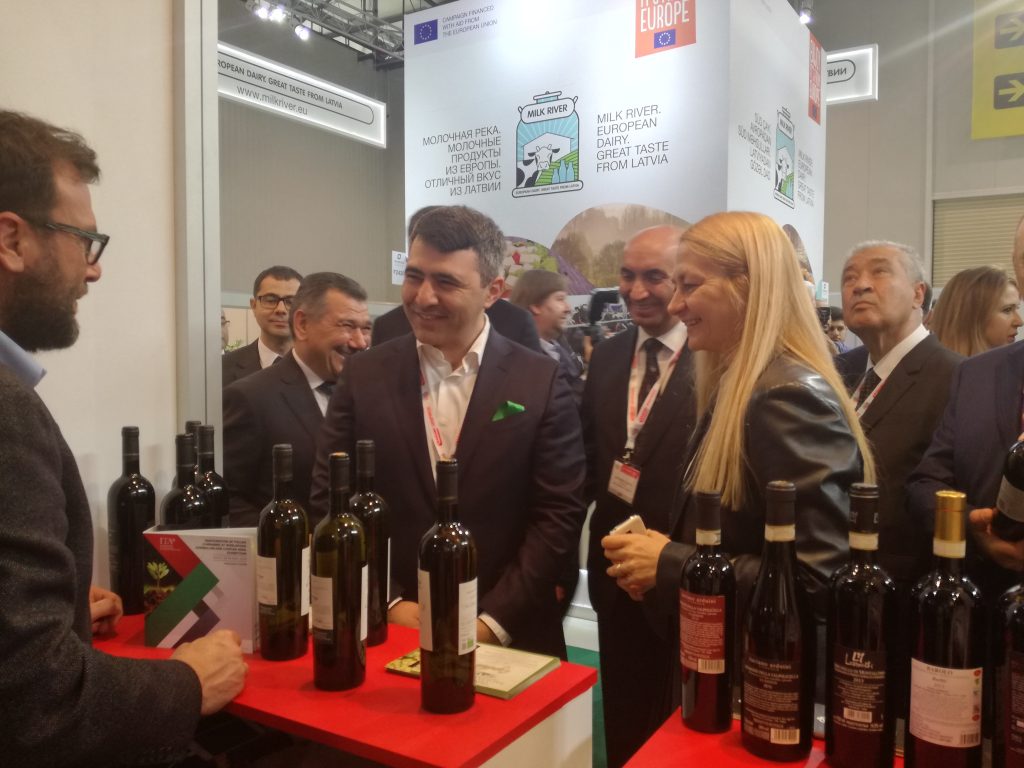
Manuela Traldi: The History of Bilateral Economic Relations Between Azerbaijan and Italy is Strongly Centred on the Energy Sector
An interview with Mrs. Manuela Traldi, President, ITAZERCOM.
By Daniel Pommier.
AT: Mrs. Traldi, thanks for answering to Azerbaijan Today. Nine years ago the adventure of the Italian Chamber of Commerce began. the Chamber of Commerce was officially recognized in 2016. Now, after all these years can you summarize success and setbacks of this outstanding work.
Indeed, in July 2022 we shall celebrate the 10-year anniversary of ITAZERCOM foundation, which took its final denomination as Italy-Azerbaijan Chamber of Commerce, at the time of recognition by the Italian Ministry of Economic Development. It is therefore a good time for an analysis of our experience on the field, between Azerbaijan and Italy. Many things have changed since we started this adventure, especially in Azerbaijan, but also in the perception and increased appreciation of this wonderful country by the Italian people.
From our point of view, over the past nine years, and through the different phases in the Azerbaijani economy, we could witness not only the implementation of great projects and of international events, but also, more impressively, how the Country turned the 2015-2018 crisis into an opportunity for economic diversification, through the massive and continuous series of reforms, still underway to date, which have revolutionized the entire public administration and the market, acting as a driving force for economic and social development, and for investment attraction.
In this framework, adapting to changing economic scenarios, we have been actively promoting and facilitating, in many ways, the commercial opportunities and investment projects in Azerbaijan within the Italian business community, and vice versa, sometimes successfully and sometimes less so, but always with passion and great gratification, also thanks to the cooperation and support by the Embassies, by ASK, AZPROMO, SMB Agency, SCIP and all the main Azerbaijani governmental and public Institutions.
AT: The mutual trade turnover between Azerbaijan and Italy totals $6bn. What sectors of the economy do these indicators cover? What are the areas of major cooperation between Italy and Azerbaijan on economic and trade terms? Which areas are likely to develop in the next years?
The history of bilateral economic relations between Azerbaijan and Italy is strongly centred on the energy sector, which still constitutes the most consistent part of the interchange and has been seeing Italy, for many years, in the position of first buyer of Azerbaijani oil products. Agriculture is another sector that is becoming increasingly important in Azerbaijan’s exports towards Italy, particularly regarding hazelnuts, of which Italy is the third largest buyer. We are actually expecting that the introduction of new exportable non-oil products, due to the investments in the agricultural and industrial sectors, shall further increase the overall exports of Azerbaijani products to Italy.
On the Azerbaijani market, the demand for typical Italian products, from fashion to furniture, industrial machinery, automotive and food & beverage, is also well established, and for decades the Italian engineering companies have contributed to the design and construction of the main infrastructures for the upstream, midstream and downstream oil industry, up to the works for the SGC. Nevertheless, quite understandably, the bilateral trade balance so far has been negative, in favor of Azerbaijan. For this reason, a strong cooperation between our Countries, where Azerbaijan is supported in the economic diversification effort for the further reduction of the still predominant weight of the energy sector, while Italy has the opportunity to export skills and know-how, might be mutually beneficial, and also address the trade imbalance, which is a very sensitive item on the Italian government agenda. Our Chamber, also in consideration of the strong incentives available in both Countries, is therefore promoting, with a special emphasis, cooperation and joint-venture projects related to various productions, in the industrial and agricultural sectors, as well as, to logistic and/or production platforms, to packaging, to ICT, in support of Azerbaijan’s industrial and economic development, and, as much as possible, in a circular and sustainable perspective. We hope to see a 360° mutual cooperation, embracing areas, such as defense, infrastructure, renewables and environment, agriculture, ICTs, tourism, cultural heritage, along the guidelines of the multidimensional strategic partnership signed by President Ilham Aliyev with the Italian Prime Minister, during the extremely successful State visit to Rome in February 2020.
AT: At present, Azerbaijani gas is exported to Italy via the Trans-Adriatic Pipeline. How do you assess this significant event for the economy of both countries?
Well, TAP’s start of operation from 30 December 2020 was indeed the best ending of an excellent year for the bilateral relations. After eight months, in September 2021, the pipeline crossed the line of the first 5 billion cubic meters transported, gradually reaching 50% of its initial capacity.
The potential developments, though, both in terms of higher volumes, and of different carbon-neutral energy sources, such as hydrogen, are manifold. In addition to the evident direct economic effects, both for the Shah Deniz consortium partners and for the Italian operator and counterparts, the strategic importance of this infrastructure reflects in various ways on the respective economies and social affairs, as well as boosting bilateral cooperation in different sectors, and generating opportunities for economic growth and development, at local and international level, with a view to supporting the energy transition.
AT: How many companies and individuals are associated with Itazercom? Are they major companies of Small and Medium Businesses?
According to our Statutes, any company, institution, corporation or physical person having its seat or residence in Italy or Azerbaijan may be eligible to be a Member of Itazercom.
As we are business oriented and take very seriously our responsibility when introducing a company to Azerbaijan or to the Italian market, quantity has never been a priority, and we have focused mainly on the selection of members for our organization.
Selection criteria do not include business size, as we are pleased and honored to have among our members, very large corporations, such as Ferrero, or Leonardo, as well as Medium and Small enterprises, all characterized by their level of business integrity and excellence, in different economic sectors.
After a few years of controlled growth, though, during which we have mainly dedicated ourselves to creating and reinforcing the institutional and business networks in both Countries, and to providing added-value support to our members, we have now set revised membership targets, removing the previous 100 members overall limit, and we are launching a specific campaign for Azerbaijan.
AT: After Azerbaijan has restored its territorial integrity, many foreign companies have expressed interest in accelerating socio-economic development and building new infrastructure in the liberated lands. Italian state company Ansaldo Energia has signed a contract with Azerbaijan’s Azerenergy JSC to supply equipment to four 110 kW electric power substations in Karabakh. We would like you to give us extensive information about the provisions of this agreement.
This contract is particularly significant, as it was the first one to be awarded to an Italian company after the end of the 44 Days War, in the framework of the reconstruction of the liberated territories. It follows, on 18 December 2020, a previous Memorandum of Understanding, signed by Azerenerji JASC and Ansaldo Energia in Rome, during the Presidential visit in February 2020, and it concerns the supply of four substations in the districts of Agdam, Kalbajar, Gubadly and Fuzuli, for a contract value of approx. € 5.000.000. The expected further cooperation with Azernergy for the creation of new energy infrastructure, may include as well for Ansaldo Energia, as one of the leading companies in Italy and the world in the field of power generation, including services, power plant construction, and equipment, some projects discussed between the parties, such as the implementation of small hydropower stations in the Kalbajar and Lachin regions, the development and supply of software and new technologies for transmission systems, and the establishment of a joint training center.
I do believe that the reconstruction, not only infrastructural, in the territories, so devastated by three decades of Armenian military occupation and by thousands of landmines, may become an opportunity to further strengthen the ties between Azerbaijan and Italy, in a cooperation that transcends business and is aimed at bringing life back to these Azerbaijani lands, confirming Italy’s support and sincere friendship.
AT: What is the current percentage of the Italian companies’ investment in the non-oil sector of the Azerbaijani economy?
As I often highlight when I address the Italian business community, Italy ranks as Azerbaijan’s client #1, but in the rankings of Foreign Direct Investments in the Country, Italy hardly appears in the top 10. This situation is not new. Even in the oil & gas sector, the value of Italian FDIs has been lower than those by other European countries. In the non-oil sector, although there have been some recent investment projects, the Italian participation has a great margin for improvement, both in terms of number of projects and in terms of amount, also in consideration of the governmental incentives in support of foreign investments offered to the Italian companies by the Export Credit Agency SACE, together with SIMEST. In this sense, our Chamber is particularly committed to promoting Azerbaijan as an investment destination and to coordinating joint-venture projects and partnerships in the sectors of greater interest for potential Italian co-investors.
AT: What changed after Covid 19 pandemics? How the global disease affected the magnitude of trade relations and investments?
As I mentioned, the pandemic coincided with an exceptionally positive period in the bilateral relations, as prepared, in particular, by the session of the Intergovernmental Commission held in Rome in January 2020 and by the Presidential visit and Business Forum on February 20 and 21, 2020, where we managed to sign over 26 agreements among all the main public and private institutions from all the main strategic sectors, just a few hours before the discovery of Covid patient Zero in Italy and the official start of the pandemic. Throughout lockdowns, cooperation and work were never interrupted. As a matter of fact, the official figures on the interchange show a percentage change for the first half of 2021, over the corresponding period of the previous year, of + 0.7 for exports to Azerbaijan and of + 48.5 for exports to Italy. Considering a previous reduction in trade in 2018 and 2019 with respect to the previous years, we can therefore observe a positive resilience of trade between the two countries in 2020 and 2021, even mitigating the effect of Covid, compared to what we have seen with other countries. Of course, every investment has been put on hold during this period, but I believe that in the meantime the conditions have matured for a more focused and efficient investment attraction, and implementation, activity.






